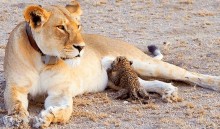Private guides and guided tours in Gambia

Gambia
Language: English
Currency: US dollar (USD)
Calling Code: +220
CAPITAL CITY OF Gambia: Banjul
LANGUAGE OF Gambia: English
CURRENCY OF Gambia: US dollar (USD)
COMMENTS ABOUT Gambia:
The Gambia, officially the Republic of The Gambia, commonly known as Gambia, is a country in Western Africa
Cities : Banjul (Capital), Bintang, Bakau
Best Places :Banjul, Juffure, Bakau Kachikally, Janjanbureh
Visas / Passport :US and South African citizens must obtain a Gambian visa before entering the Gambia. New Zealanders, Australians, British, Finnish and some Europeans do not require visas for stays up to 90 days.
Eat :Benachin or Jollof rice, spices, tomatoes, Chicken Yassa, Domoda, Lots and lots of peanuts
Calling code : +220
Time zone :GMT
The Gambia gained its independence from the UK in 1965; it formed a short-lived federation of Senegambia with Senegal between 1982 and 1989. In 1991 the two nations signed a friendship and cooperation treaty. A military coup in 1994 overthrew the president and banned political activity, but a 1996 constitution and presidential elections, followed by parliamentary balloting in 1997, completed a nominal return to civilian rule. The country undertook another round of presidential and legislative elections in late 2001 and early 2002. Yahya A. J. J. JAMMEH, the leader of the coup, has been elected president in all subsequent elections.
CLIMATE OF Gambia: Tropical; hot, rainy season (June to November); cooler, dry season (November to May); Natural hazards : drought (rainfall has dropped by 30% in the last 30 years)
RELIGION OF Gambia: Muslim 90%, Christian 9%, indigenous beliefs 1%
POPULATION OF Gambia: 1,546,848 (July 2004 est.) Muslim 90%, Christian 9%, indigenous beliefs 1%>>>>
HISTORY OF Gambia: The Gambia gained its independency from the UK on 18th February 1965. A constitution was written on 24th April 1970, before being suspended in July 1994, before being rewritten and approved by national referendum on 8th August 1996. It was reestablished in January 1997
The Gambia formed a short-lived federation of Senegambia with Senegal between 1982 and 1989. In 1991 the two nations signed a friendship and cooperation treaty. A military coup in 1994 overthrew the president and banned political activity, but a new 1996 constitution and presidential elections, followed by parliamentary balloting in 1997, completed a nominal return to civilian rule. The country undertook another round of presidential and legislative elections in late 2001 and early 2002.
ECONOMY OVERVIEW OF Gambia: The Gambia has no important mineral or other natural resources and has a limited agricultural base. About 75% of the population depends on crops and livestock for its livelihood. Small-scale manufacturing activity features the processing of peanuts, fish, and hides. Reexport trade normally constitutes a major segment of economic activity, but a 1999 government-imposed preshipment inspection plan, and instability of the Gambian dalasi (currency) have drawn some of the reexport trade away from The Gambia. The government's 1998 seizure of the private peanut firm Alimenta eliminated the largest purchaser of Gambian groundnuts; the following two marketing seasons have seen substantially lower prices and sales. A decline in tourism in 2000 has also held back growth. Unemployment and underemployment rates are extremely high. Shortrun economic progress remains highly dependent on sustained bilateral and multilateral aid, on responsible government economic management as forwarded by IMF technical help and advice, and on expected growth in the construction sector.



 French
French Spanish
Spanish Russian
Russian